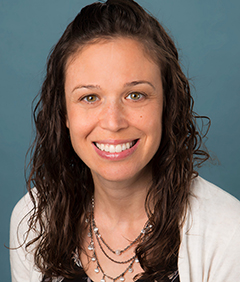February 24, 2023

NIEHS grantee Abby Fleisch, M.D., M.P.H., studies how exposure to environmental pollutants early in life can harm health as we age. A pediatric endocrinologist at Maine Medical Center, Fleisch focuses on conditions related to hormones, like diabetes, obesity, and bone health — all of which can have health consequences throughout life.
From an early age, diverse interests fueled her career trajectory. As an undergraduate, she dove into conservation research at Northwestern University studying scallops and spider web design.
“Those projects fostered my interest in environmental studies and introduced me to experimental design and scientific writing,” she said.
An avid outdoor enthusiast, Fleisch also worked as a National Park Service ranger at Grand Canyon and Glacier National Parks. Seeing a growing body of research emerge linking air pollution, metals, and other pollutants with effects on human health convinced her to pursue a medical career.
“I chose to attend medical school so I could be at the forefront of those research efforts and understand the underlying mechanisms of environmentally induced disease,” she said. “I wanted to be able to identify potential remedies to improve health and to help inform health-protective policies.”
Honing Her Interests
At the Northwestern University Feinberg School of Medicine, Fleisch participated in an NIH clinical research training program where she worked with Jack Yanovski, M.D., Ph.D., studying predictors of pediatric obesity. During her pediatric residency at Boston Children’s Hospital, she merged her interests in environmental studies and human health through a rotation at the Mount Sinai Pediatric Environmental Health Specialty Unit.
“I had the opportunity to work with pediatrician and environmental health advocate Philip Landrigan, M.D.,” she said. “I enhanced my skills in scientific collaboration and gained experience communicating my research and interacting with the media. This was a watershed experience for me, solidifying my commitment to a career in pediatric environmental health.”

Following her residency, Fleisch completed dual fellowships in pediatric endocrinology at Boston Children’s Hospital and in pediatric health services research at Harvard, earning a Master of Public Health degree along the way. During her time at Boston Children’s, she worked with Emily Oken, M.D., and the Project Viva cohort, a long running study investigating the influences of environmental health on pregnant women.
“Dr. Oken’s mentorship and the opportunity to work with the Project Viva cohort sparked my interest in early life determinants of health,” noted Fleisch. “The rich dataset from this cohort lends itself to studying diverse prenatal and early life exposures that can affect health.”
In 2015, Fleisch received a career development award from NIEHS, with Oken, Diane Gold, M.D., and Margaret Karagas, Ph.D., as mentors. Using data from the Project Viva cohort and the New Hampshire Birth Cohort Study, she demonstrated that exposure to higher levels of air pollution during pregnancy is associated with maternal hyperglycemia, lower fetal growth, and more rapid infant weight gain, which together may predispose infants towards cardiometabolic health problems later in life.
“Interactions with my mentors and collaborators are a big part of why I enjoy the work that I do,” Fleisch reflected. “Being able to build those relationships early in my career, and continuing to foster them over the past decade, have been invaluable.”
Tackling New Challenges
In 2019, Fleisch received an Outstanding New Environmental Scientists (ONES) award from NIEHS to continue her work with Project Viva, this time focusing on phthalates and per- and polyfluoroalkyl substances (PFAS), groups of synthetic chemicals found in many consumer goods.
“Our goal through this work is to study the extent to which childhood exposures to PFAS and phthalates may be contributing to obesity and low bone mineral density across adolescence,” she explained. “Low bone mineral density in adolescence tracks into adulthood and may increase the risk of bone fractures and osteoporosis later in life.”
One way people are exposed to PFAS and phthalates is through food, so Fleisch and her team used data from Project Viva and from the National Health and Nutrition Examination Survey to identify dietary patterns that explained the most variation in PFAS and phthalate concentrations.
“Identifying the dietary factors most strongly linked to PFAS and phthalate concentrations allowed us to examine associations of these chemicals with health outcomes independent of those dietary factors,” Fleisch said.
In Project Viva participants, the team linked exposure to PFAS with lower bone mineral density and changes in body composition in childhood and adolescence, and with delayed puberty in girls.
“The ONES award gave me the support I needed to launch my independent research career and build a team,” said Fleisch. “With the wealth of data available from Project Viva, we’ve been able to explore pressing questions of public health concern, such as for PFAS.”
Bringing It Home
PFAS have been increasingly in the spotlight nationally, and Maine is no different.
“In my clinical practice, parents often ask about the role of the environment in their children’s health and how to reduce potential exposures,” Fleisch noted. “In addition to conducting research that informs public health policy, it’s important to me to be able to begin to answer those questions for my patients.”
Fleisch explained how the recent guidance for clinicians on PFAS exposure, testing, and follow-up from the National Academies of Science, Engineering, and Medicine (NASEM) has been a valuable resource in providing guidance to patients with known PFAS exposure.
“The NASEM report was formulated by clinicians, researchers, and impacted community members to guide clinicians in health monitoring for patients with PFAS exposure, but there are still a lot of unknowns with this class of chemicals,” she said. “Building on my current research, I’m interested in examining the role of PFAS on later life health outcomes, including osteoporosis and cardiovascular disease. I also want to explore what we can do to mitigate those effects, such as through diet or lifestyle interventions, and ultimately apply these findings to our communities in Maine.”


